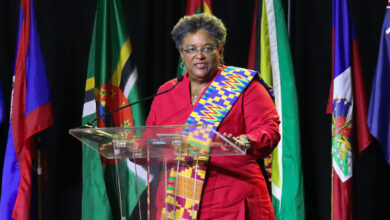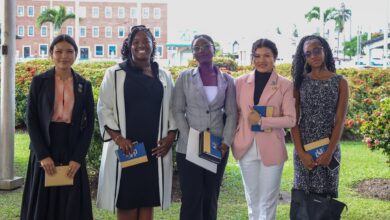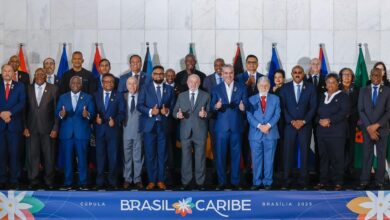(CARICOM Secretariat, Turkeyen, Greater Georgetown, Guyana) CARICOM Leaders, on Thursday, were on one accord regarding the future of regional integration and subsequently the Community, as they opened the 30th Meeting of the Conference of Heads of Government in Georgetown, Guyana.
At least four CARICOM Heads of Government who addressed the opening ceremony, asserted that despite the challenges precipitated by global recession and the differences that sometimes reared its head among CARICOM leaders; they intended to stay the course, since there was no alternative to regional integration.
Leading the charge was the Hon Dean Oliver Barrow, Immediate Past Chairman of CARICOM and Prime Minister of Belize, who said the Community, remained resilient in the face of the global recession, and its leaders were unanimous in their determination to stay the course.
He outlined several achievements of the Community, including the critical role it played in the recently concluded United Nations conference on the global financial crisis; its advocacy for Cuba’s re-integration into the Organisation of American States (OAS); the hosting of the Fifth Summit of the Americas and the Caribbean’s aggressive response to Climate Change.
He asserted that the “Developed World’ as the catalyst of the economic crisis had failed to discharge their responsibility to the Caribbean during this critical period and criticized them for failing to assist the Caribbean with Climate Change mitigation and adaptation measures, which he described as a matter of life and death. Alluding to the works of Caribbean novelists, VS Naipaul, Prime Minister Barrow said, despite the un-responsiveness of some Third States, “We refuse to become nothing … We will make fast our place in the world… but most of all we will be lifted by our own proud spirit”.
In a similar vein, the newest Head of Government in the Community, the Rt. Hon Tillman Joseph Thomas, Prime Minister of Grenada, stated that the Community had weathered the global financial storm quite well and had responded positively to the challenges, especially in areas such as democracy and governance, building human capital and capacity; Information and Communication Technologies and knowledge improvement.
He added however, that the response could be magnified if Community leaders adhered to the spirit of the Grand Anse Declaration which sought to deepen the integration process. Prime Minister Barrow outlined four critical steps which he stated were necessary for the survival of the Community: Leaders, he said must find a common ground on some contentious issues such as contingent rights and the proposed CARICOM Travel Pass (CARIPASS); secondly, the Community should consolidate existing relations with Third States, even while forging new strategic alliances to address trade, security, institutional strengthening and health development, and fourthly, focus on youth development as the vibrancy of the Region.
“The integrity of the movement is at stake. Let not our integration movement falter … Let us re-examine the level of political will we intend to offer…and in our deliberations re-examine our priorities…,” thus ensuring the Community’s viability and “consolidate its place in the global environment to secure the future of our Caribbean peoples,’ he concluded.
Newly re-elected Prime Minister of Antigua and Barbuda, the Hon. Baldwin Spencer noted that the challenges of the Community were great but not insurmountable and re-affirmed his government’s commitment to the principles of the integration movement but hastened to add that this was not going to be at the expense of his people.
Incumbent CARICOM Chairman and President of Guyana, H.E. Bharrat Jagdeo, agreed that the strength of the Region lay in the strength of its democracy; its positive record of human rights; its model of peace and its unity of voice in critical matters, especially in the matter of Climate Change.
He too agreed that developed countries were “not pulling their weight” in their response to Climate Change issues and the attendant economic burden to the Caribbean, but was convinced that despite setbacks, the region had achieved much and could do much more with patience and tolerance. He reiterated the need for institutional strengthening and also declared that there was no alternative to integration.
The 30th Regular Meeting of CARICOM Heads of Government is taking place on the twentieth anniversary of the Grand Anse Declaration 1989 which led to the Revised Treaty of Chaguaramas and the deepening of the integration process via the CARICOM Single Market and Economy.
The Meeting continues on Friday, with business sessions at the Guyana International Convention Centre (GICC). Those sessions will focus discussions on four clusters of items: Economic Development, Human and Social Development; Strengthening the Community; and Strengthening Alliances/Forging New Relations.





